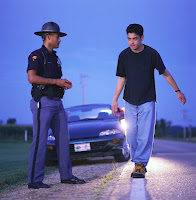 |
| The "Walk & Turn" is one of the Standardized Field Sobriety Tests |
You can use these links to jump to following sections of the article:
Traffic Stop
Roadside Detention
Field Sobriety Tests
Officer's Arrest Decision
Miranda Warnings
Operating Under the Influence of Drugs
How a Lawyer Can Help Your Defense
There must be a legitimate reason to detain a suspect. The police cannot just stop a car on a hunch; they must have a reasonable belief that the driver is breaking the law. If the traffic stop is improper, all evidence obtained from that stop should be kept out of the Operating Under the Influence trial.
Roadside Detention:
That stop was probably based on a plate light or blinker or other minor infraction. The officer must have some reason to believe that you are under the influence of alcohol of drugs to further detain you for field sobriety tests. If an officer detains you to do these tests without a good reason, they have acted illegally and any evidence they gain from that point on should be kept out of trial.The officer uses the information learned above in deciding to make an arrest. That arrest must be based on probable cause to believe that a crime has occurred. If there is not sufficient cause to support the arrest decision, a judge should exclude from trial any evidence developed after that arrest.
The police might ask the driver questions in order to develop additional evidence, in the form of the defendant's own statements, which can be offered at trial. If an individual is "in custody" at the time the questions are asked, then the law requieres that the police first inform the driver of their rights to remain silent and right to counsel. If the office fails to do this, the answers to those questions should be keep out of court.
After arrest, people are required to submit to an alcohol breath test. Most tests in Maine are done using 10 or 20 year old machines. The testing device must be properly approved by State agencies, must be properly maintained and calibrated and the device must be operating correctly. If the machine used in your case was not properly calibrated, maintained or functioning, a judge should exclude the test result from trial.
Testing Procedure:
An officer administering the breath test must be trained and certified and the testing must be done according to proper procedure. This requires a 15 minute observation period before the test. The subject must have any foreign objects removed from the mouth and be observed continuously. The officer must make sure they do not burp, vomit, drink or eat anything as this might contaminate the breath test. Subjects normally blow in the machine twice but might give more samples if there are problems with the machine or with one of the samples. A judge can prevent an improper breath test from being admitted at trial.Time Elapsed Between Operation and Testing:
Normally, police get a breath test reasonably soon after the time the defendant drives the car. If the test is accurate, it tells what the alcohol concentration was at the time of the test. In some cases, one or two hours or more might pass between the time of operation and the time of testing. The question then becomes, how much does the test result really tell the court about whether the driver was under the influence at the at the time they operated the car? A person might be below the limit when they drive, get pulled over and arrested on suspicion of OUI, as they for the test they absorb alcohol and give a breath test that is over the limit.Pleading guilty at your initial appearance, guarantees your conviction. Discussing your case with an attorney might reveal defenses or weaknesses in the State’s case. A lawyer can also talk with the prosecutor to negotiate a more favorable resolution even when no strong defenses are available. If you intend to plead guilty, a lawyer can still review the evidence to make sure that there are no major issues and to confirm that you are making the right decision.
If you want to discuss any of these or other issues, please consult with an attorney. I am always happy to meet with potential clients in my office to discuss possible defenses. I never charge a fee for those initial consultations.

No comments:
Post a Comment